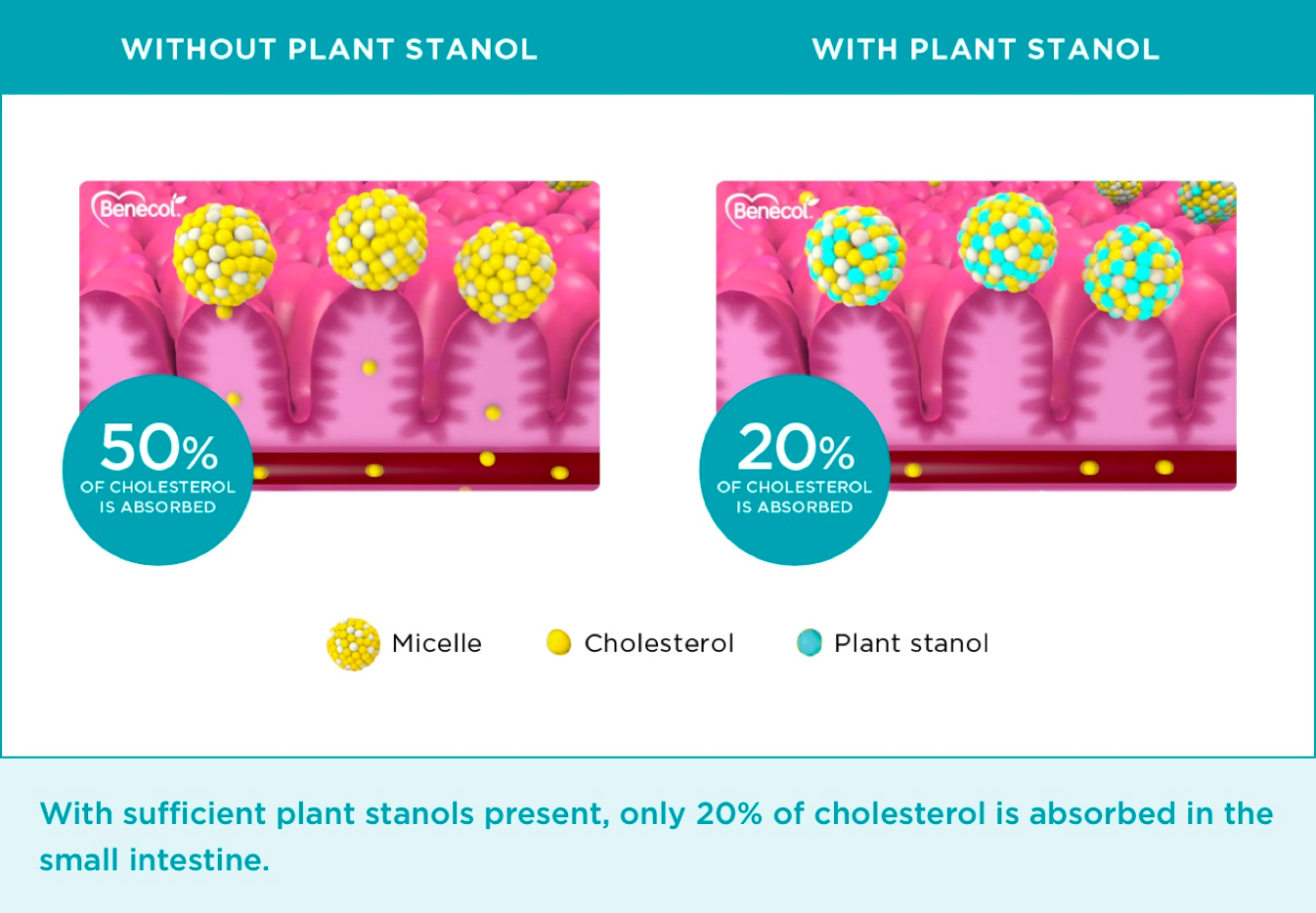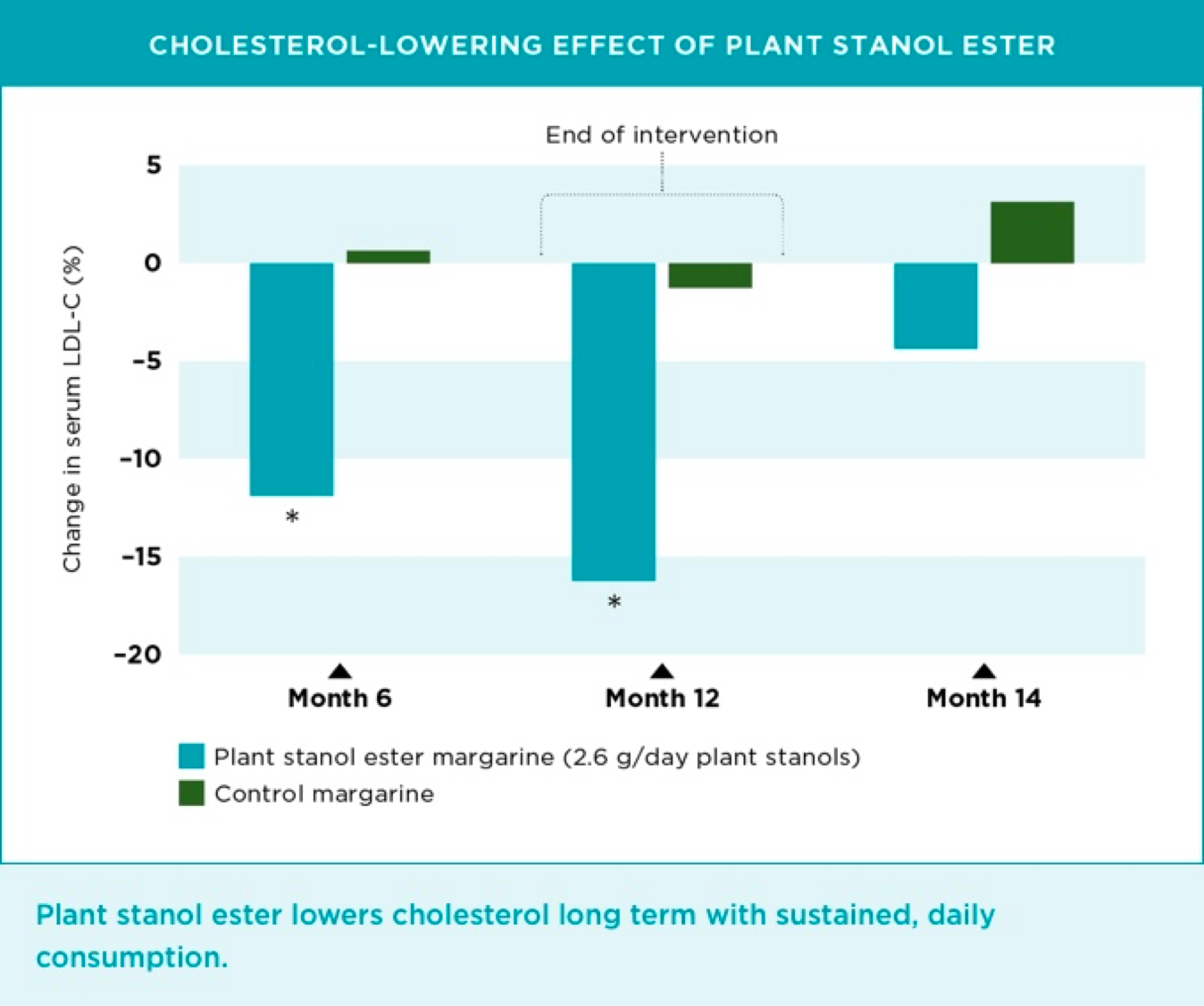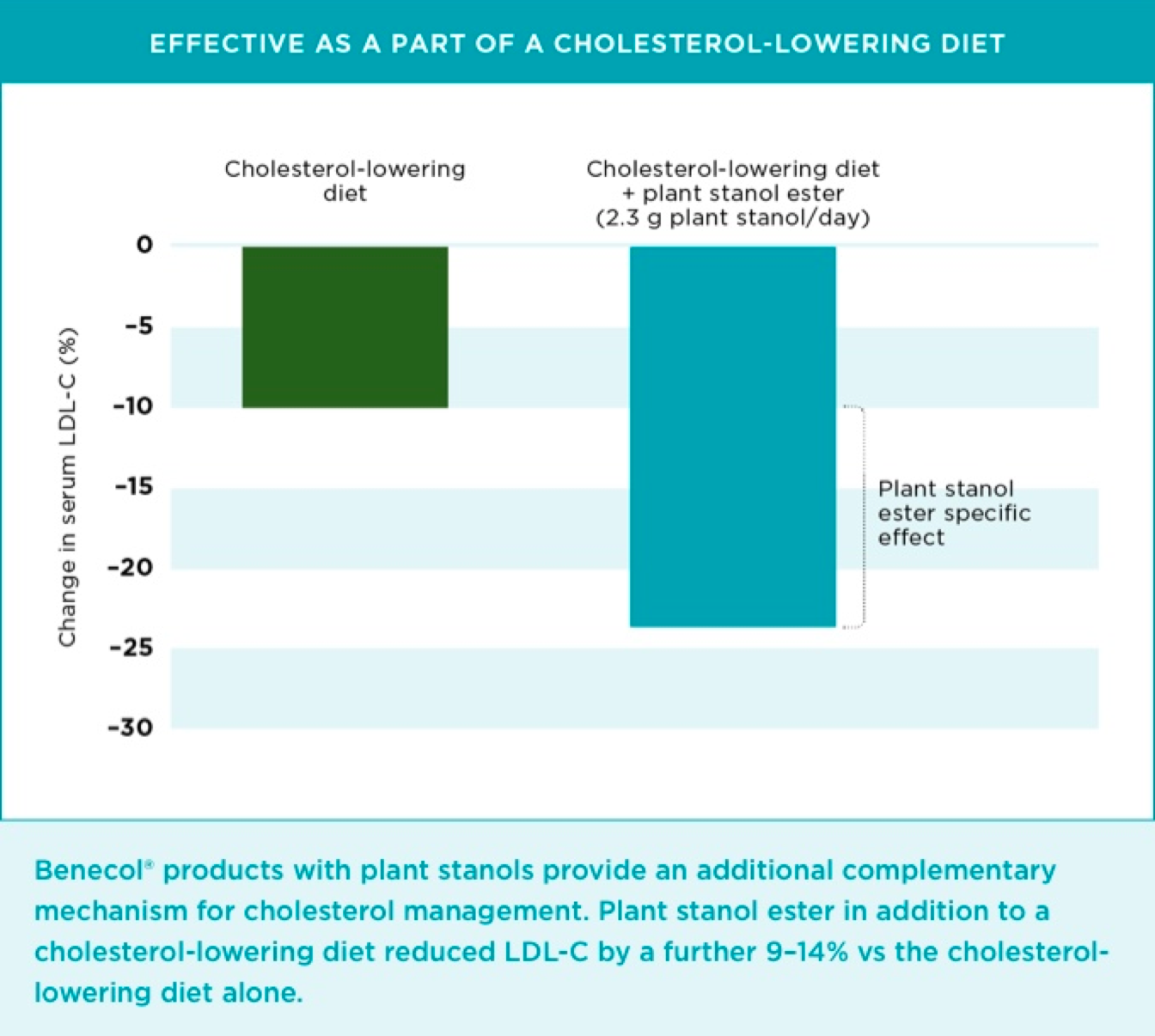Plant stanols: Clinically proven in 80+ studies
Benecol is a range of foods which contain cholesterol-lowering plant stanol ester. Plant stanol ester is a compound that lowers blood cholesterol by interfering with and reducing cholesterol absorption in the small intestine1. A daily intake of 1.5–3.0 g of plant stanols reduces LDL cholesterol by 7–12.5% in 2–3 weeks2. This effect is sustained as long as the daily intake of plant stanol is within the recommended range3.
Benecol is a range of cholesterol-lowering foods which contain a unique ingredient – plant stanol ester.
Plant stanol ester partly inhibits cholesterol absorption in the small intestine1.
Research has shown that in just 2–3 weeks, a daily intake of 1.5–3.0 g of plant stanols found in Benecol products reduces LDL cholesterol by 7–12.5% in 2–3 weeks2. This reduction is in addition to what can be achieved with other dietary changes and/or statin therapy.
Plant stanols are plant-based compounds that lower blood cholesterol and are naturally found in certain foods. The most common dietary sources of plant stanols are cereals, mainly wheat and rye4,5. The daily intake of plant stanols from a normal diet is about 20–30 mg/day6,7.
Plant stanols structurally resemble cholesterol, which is why they can interfere with cholesterol absorption in the small intestine. Reduced absorption of cholesterol results in reduced serum LDL cholesterol levels, and therefore reduced total cholesterol.
Plant stanol ester is added to Benecol products to ensure an adequate intake of plant stanols to achieve the cholesterol-lowering benefit, as amounts consumed in the average diet are too low to effectively lower serum cholesterol6,7. Plant stanols are added to Benecol foods as plant stanol ester, which is formed when plant stanols are esterified with vegetable oil fatty acids. Plant stanol ester is easily added to food products without compromising taste, and it ensures that the product lowers cholesterol effectively when consumed with a meal3,8.
A daily intake of 1.5–3.0 g of plant stanols reduces LDL cholesterol by 7–12.5% in 2–3 weeks2. This effect is sustained as long as the daily intake of plant stanol is within the recommended range3. Drinking just one Benecol yogurt drink per day, for example, provides 2 g of plant stanols, helping patients to achieve their daily intake requirements.
Plant stanol ester lowers both blood total and LDL cholesterol by partly inhibiting the absorption of cholesterol in the small intestine. High-density lipoprotein (HDL) cholesterol concentration is not affected, however1,3,10–13. Non-HDL cholesterol is a well-established marker for cardiovascular risk and is also lowered by plant stanol ester3.6.
As soon as plant stanol ester reaches the small intestine, it is rapidly hydrolysed to free plant stanols and fatty acids by the pancreatic enzyme cholesterol esterase14. The free plant stanols can then interfere with cholesterol absorption due to the structural similarity of plant stanols to cholesterol. They are able to partially displace cholesterol from mixed micelles, meaning that less cholesterol would be absorbed into the bloodstream. Consuming plant stanol ester reduces the absorption of both dietary and biliary cholesterol10. A daily intake of 2 g plant stanols reduces cholesterol absorption by about 50%10,15.
The fatty acid part of plant stanol ester is absorbed into the body in the same way as other dietary fatty acids are, whereas plant stanols are virtually un-absorbable. The fact that plant stanols do not contain any double bonds ensures that plant stanols are effectively eliminated from the body intact9.

Plant stanol ester partly inhibits cholesterol absorption in the small intestine.
To maintain the cholesterol-lowering effect of plant stanols, 1.5–3.0 g must be consumed daily with a meal2. This effect is sustained as long as the daily intake of plant stanol is within the recommended range3.
Clinical data have shown that the cholesterol-lowering effect of plant stanol ester was sustained throughout a 12-month intervention period3. However, follow-up sampling 2 months after the intervention period ended showed that LDL-C rose back to starting levels, suggesting that plant stanol ester needs to be continuously consumed on a daily basis to gain long-term benefits3.

The sustained cholesterol-lowering effect of plant stanol ester has been confirmed in other long-term studies (12–18 months duration)16–18. The effect has also been shown in conjunction with statin treatment17, both with plant stanol ester containing margarine3,16,17, and single-serving yogurt drinks18.
It is not necessary to consume plant stanol ester at every meal to lower cholesterol efficiently19. As long as plant stanol ester consumption is sufficient and daily, the efficacy is consistent – independent of whether the daily dose is consumed at one occasion or divided over several meals19.
Plant stanol esters are hydrolysed into free plant stanols upon reaching the small intestine14. The free plant stanols are then able to interfere with cholesterol absorption by partially displacing them from mixed micelles as both compounds are structurally similar. As such, consuming plant stanol ester reduces the absorption of both dietary and biliary cholesterol. Thus, for optimal efficacy, plant stanol ester should be consumed together with a meal as bile and pancreatic enzymes are excreted in the gastrointestinal tract only after a meal20.
Learn more about the rapid and sustained effects of plant stanol ›
The reduction in LDL-C achieved with plant stanol ester is independent of the background diet. Plant stanol ester works just as well in a diet with a relatively high content of saturated fat and cholesterol as in heart-healthy diets which are low in saturated fat and cholesterol13,21–23.
Studies have shown that the cholesterol-lowering effect of plant stanol ester and that of a healthy, lipid-lowering diet are additive and that plant stanol ester can dose dependently reduce LDL-C by an additional 9–14%13,24compared to a low-fat diet alone.

The 2019 joint European Atherosclerosis Society (EAS)/European Society of Cardiology (ESC) guidelines define the target groups for plant stanol ester use as26:
Individuals who have elevated serum cholesterol levels and are at low or intermediate global cardiovascular risk but who do not need cholesterol-lowering medication
High- and very high-risk patients, such as patients with diabetes, who fail to achieve LDL-C targets on statins alone, or are statin intolerant
Adults and children (from the age of 6 years) with familial hypercholesterolaemia
When helping your patients to manage their cholesterol, recommending they add Benecol foods with plant stanols to their diet can help them lower their LDL-C levels2.
In order to give you the best experience, we have set our website to allow cookies. Choose OK, if you accept the use of these cookies. Privacy Policy